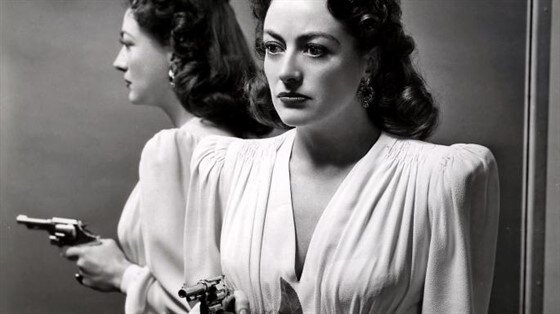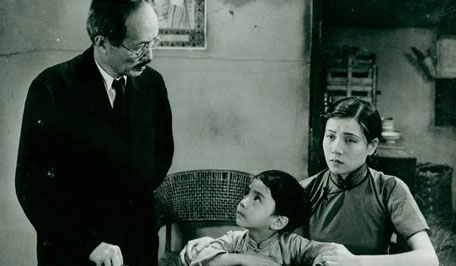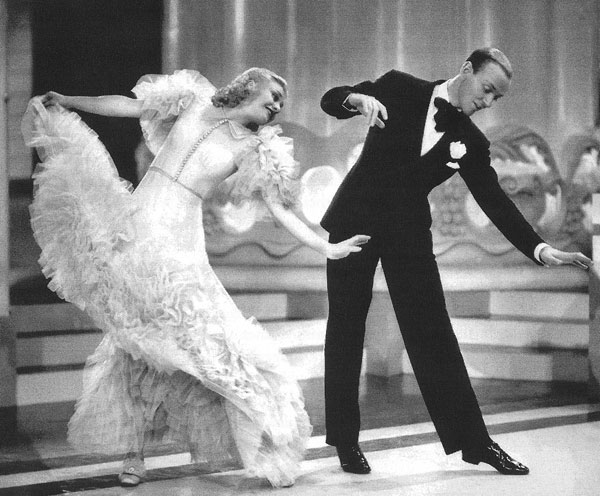Melodrama Film Analysis

Melodrama, Madness, and Money
Melodrama is a particularly fertile way to explore the ways that public conflicts are displaced onto familial relationships, and emotion becomes the primary register for human expression and conflict. In Mildred Pierce (Michael Curtiz, 1945), Mildred (Joan Crawford) faces both relationship conflicts with the man she loves, Monte (Zachary Scott), and familial conflicts with her daughter Veda (Ann Blyth). In Cairo Station (Youssef Chahine, 1958), the main conflict revolves around Qinawi (Youssef Chahine) and his love interest, Hannuma (Hind Rostom), who is already engaged to Abu Siri (Farid Shawqi). The melodrama throughout each film was elegantly captured through close-up shots, exaggerated figure behavior, provoking music, and emotional dialogue. Both Veda and Quinawi are driven to madness and criminal activity upon having their romantic fantasies rejected by their love interests, exaggerating the psychological effects of falling in love with someone who does not have mutual feelings while also revealing the extent to which financial success can affect both familial and romantic relationships.
Mildred Pierce
The audience can automatically expect Mildred Pierce to be melodramatic from the very beginning of the film, which introduces an intense score as we witness Monte get shot by bullets multiple times, clutch his chest, tumble to the floor, and flop over so he faced the ceiling. The camera closely follows his figure behavior as it drops to the floor, providing a close-up shot for the exact moment when he whispers “Mildred” just seconds before dying. We then hear the music intensify as the camera pans to the mirror he was just standing by, now with bullet holes in it. Saddening music sets the melodramatic tone yet again for the film’s very next scene, featuring Mildred looking depressed as she walks alone along a rainy boardwalk, looking off into the distance at crashing waves as tears well in her eyes. Cross-cutting between her grief-stricken facial expressions as she contemplates jumping over the rail and the sea below her emphasizes the multi-faceted conflicts she has faced, which viewers do not understand quite yet. At this moment in the film, camp seems to play a role in the melodrama as Mildred wears an extravagant fur coat revealing her wealth, yet her financial accomplishments cannot seem to fill the void we see from her eyes. Music once again amplifies the drama of the following scene through its speed and volume as Mildred locks Wally (Jack Carson) in the beach house in an attempt to frame him for the murder of her late husband, and the camera follows Wally frantically running through the house anxiously struggling to open any of the doors in order to escape.
Veda is arguably the most melodramatic character in the film, exaggerating her concern and confusion by the investigators’ presence in her house through false facial expressions upon Mildred’s return from the beach house. Their toxic relationship as mother and daughter is disguised by a fake love performance from Veda as they clutched each other’s arms, locked eyes, and Mildred reassured her that there was nothing to worry about. This is clearly exaggerated as viewers have already witnessed through close-up shots and third-person views of Veda’s evil eyes and smirks in the film when she manipulates her mother. In the scene where Mildred’s ex-husband Bert (Bruce Bennet) and she are arguing about their marriage, a static camera captures both her and Bert’s quick, angry movements in one frame, while a close-up shot displays the tears forming in her eyes as she tells him to pack his things, melodramatically representing a relationship conflict that gets blown out of proportion and leads to divorce. In the scene when Mildred overhears Veda complaining about the quality and style of the dress her mother worked so hard to earn for her, sad music and a close-up again of Mildred’s sad and embarrassed reaction evokes frustration and empathy from viewers. A bit later, when Veda finally discovers that her mother works as a waitress, her ungratefulness and resentment towards Mildred for not belonging to high society gleamed in her eyes through a close-up shot, and the resentful sound she makes upon being hit by her mother was clearly exaggerated considering her mother has only ever been kind to her. Viewers notice Veda’s true colors from a third-person perspective through each of these melodramatic techniques combined from the dialogue, close-up shots, and score, and thus are able to identify her character’s manipulation, exaggerated behavior, and melodrama carried throughout the film.
Cairo Station
Similar to Veda’s madness that led her to kill Monte due to frustration with unrequited love in Mildred Pierce, Quinawi is a character who is driven mad in Cairo Station by his crush on Hannuma, leading him to be a murderer as well. Various relationships in the film are presented melodramatically, including the relationship between Abu Siri and Hannuma, Hannuma and Qinawi, and a young girl and her boyfriend who was leaving for college. In addition to music and dialogue in the film, elements of mise-en-scene including lighting, setting, and figure behavior collectively contributed to the melodrama of the film. At the very beginning, the melodramatic narration at the beginning of the film introduces Qinawi as a poor, homeless man who likely came to Cairo like many other young men on the streets seeking. During the scene where Qinawi is discussing his wedding and family plans with Hannuma for the future, the camera captures them both looking off into the distance with the water fountain behind them as Hannuma leads him on with a friendly smile. The setting of the fountain and the figure behavior of the two establish an exaggerated and clearly false sense of romance visible to the audience. Qinawi is stiff and close to her in contrast to her body, which is very mean and aggressive once she stops joking with him and states that he could never financially afford his dreams to be with her. This is similar to Mildred Pierce, as Veda also was too spoiled and financially demanding to truly love her mother, and she was not taken seriously by Monte when announcing she planned to marry him. There is a later scene in which Hannuma and Abu Siri are arguing in a shipping facility room and Abu hits her, causing her to dramatically flop to the haystacks on the ground and pout. After a moment of exchanging melodramatic facial expressions between the two, Hannuma’s dialogue “I’ll never disobey you” exaggerates her love and friendliness toward him. To achieve this melodrama, her figure behavior becomes much looser and playful, as she gets pushed around by her fiance whose figure is much stiffer and more controlling. During this scene, we see that Hannuma’s feelings are stronger than her fiances, and her dialogue also involves more careful thought of their wedding. During this same scene, there are melodramatic close-ups of Quinawi as he eavesdrops on them and leans against a wall from outside. The camera captures his eyes looking off into the distance, watching train tracks move as he hides behind the door. Shortly after hearing his love for her fiance, the camera zooms in on his growing frustration and we see closely him staring at knives at a nearby shop with a disturbed, glazed look in his eyes. In the scene where he attempts to murder Hannuma’s friend, dark lighting and intense music establish melodrama as she walks towards the bucket. The music gets eery and louder as she gets stabbed, and this dramatic scene remains disturbing as we see Qinawi shove the girl into a container. His figure behavior is overly shaky and frantic after that, making it obvious that he is aware of something terrible that just happened. Simply put, his love led and insecurity him to madness and murder. Later, when the container is opened, melodrama contributed to the horror of this scene by showing a closer shot of the bloody woman shaking her head and crying as she silently pleads for help after what just happened. Since melodrama involves spectacle and elements beyond narrative to exaggerate emotions, the bloody makeup, terrifying facial expressions, and helpless figure behavior of this woman exemplify it. Throughout the film, Chahine does an excellent depicting someone who is mentally insane, and the repeated close-ups of his exaggerated crazy eyes contribute to the overall horror in the film in various impactful scenes. For example, in the scene where Hannuma is hanging off the edge of the train that she and Qinawi hopped onto, and she suddenly reminds him that she is not marrying him, then we see his eyes again. This time, he directly threatened to kill her with the knife in his hand up to her neck, slightly pausing for the dramatic effect. She freaks out and runs from him throughout the dark train and hides in a room frantically. Throughout this chase, until she is held against the train tracks, we see her exaggerated facial expressions of fear. Once Qinawi is tricked into letting her go and is put into a straightjacket, the camera zooms into her face resting in the arms of her actual fiance, crying as Qinawi gets taken away. This suspense of this scene is amplified through intensifying music and a reveal from the camera shows the young girl from the beginning of the film standing in the same spot as earlier when she watched the train her boyfriend left in the head off into the distance in the direction he headed toward earlier. At the beginning of the film, we are introduced to this young couple through a girl who hopes to say goodbye to her boyfriend before he leaves for college. Qinawi watches them closely, likely wishing he could share a similar love with another woman. We later see the girl in tears as she stands still waving to her boyfriend leaving on the train, and recognize her at the end of the film in the same spot.
In both Mildred Pierce and Cairo Station, melodrama is depicted through strategic settings, over-the-top costumes, close-up shots of intense emotional facial expressions, dialogue, and purposeful scores that complement each of the scenes. We are able to identify the psychological effects of unrequited love on Mildred, Veda, and Qinawi through these details beyond the narrative.




